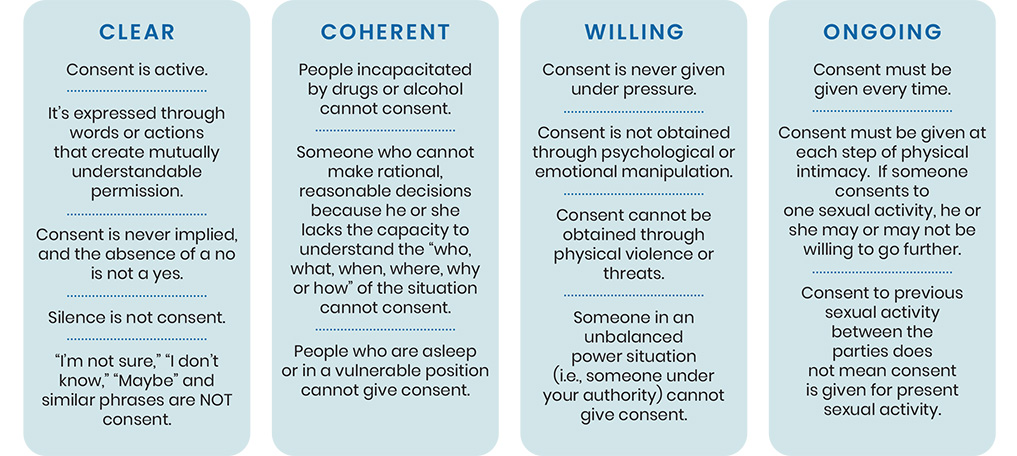Consent
-
In This Section
Consent is an agreement between participants to engage in sexual activity. There are many ways to give consent. Consent may be withdrawn at any time. An individual who seeks to withdraw consent must communicate, through clear words or actions, a decision to cease the sexual activity. Once consent is withdrawn, the sexual activity must cease immediately.
Clear, Coherent Willing and Ongoing
The following chart explains what clear, coherent, willing, and ongoing concent is and is not. Click here to download a PDF of this chart.

Physical Violence
Consent cannot be given by the use of physical violence. This means that a person is exerting control over another person through the use of physical force. Examples of physical violence include hitting, punching, slapping, kicking, restraining, choking, and brandishing or using any weapon.
Threats
Consent cannot be granted by the use of threats. Threats are words or actions that would compel a reasonable person to engage in unwanted sexual activities. Examples include threats to harm a person physically, to reveal private information to harm a person’s reputation, or to cause a person academic or economic harm.
Intimidation
Consent cannot be obtained through intimidation. Intimidation is an implied threat that menaces or causes reasonable fear in another person. A person’s size, alone, does not constitute intimidation; however, a person’s size may be used in a way that constitutes intimidation (e.g., blocking access to an exit.)
Coercion
Consent cannot be acquired through coercion. Coercion is the use of an unreasonable amount of pressure to gain sexual access. Coercion is more than an effort to persuade, entice, or attract another person to have sex. When a person makes a clear decision not to participate in a particular form of sexual contact or sexual intercourse, a decision to stop, or a decision not to go beyond a certain sexual interaction, continued pressure can be coercive.
Incapacitation
Consent cannot be gained by taking advantage of the incapacitation of another. Incapacitation means that a person lacks the ability to make informed, rational judgments about whether or not to engage in sexual activity.
A person who is incapacitated is unable, temporarily or permanently, to give consent because of mental or physical helplessness, sleep, unconsciousness or lack of awareness that sexual activity is taking place. A person may be incapacitated as a result of the consumption of alcohol or other drugs, or due to a temporary or permanent physical or mental health condition.
Incapacitation is a state beyond drunkenness or intoxication. A person is not necessarily incapacitated merely as a result of drinking or using drugs. The impact of alcohol and other drugs varies from person to person.
Examples
Examples of behavior that may constitute sexual assault due to lack of consent include:
- Engaging in sexual activity with an unconscious or semi-conscious person;
- Engaging in sexual activity with someone who is asleep or passed out;
- Engaging in sexual activity with someone who has said “no”;
- Engaging in sexual activity with someone who is vomiting, unable to stand without assistance, or has to be carried to bed;
- Allowing another person to engage in sexual activity with your partner without his or her consent;
- Requiring any person to perform any sexual activity as a condition of acceptance into a club, athletic program or any other organization affiliated with the College;
- Telling someone you will “out” them if they don’t engage in sexual activity (e.g., threatening to disclose the person’s sexual orientation without their consent);
- Telling someone you will fail them or give them a grade different from what they deserve if they don’t agree to engage in sexual activity; or
- Facilitating or assisting in a sexual assault including purchasing or providing alcohol or drugs to further a sexual assault.
Sexual Misconduct And Title IX
- Confidentiality
- Reporting
- Resolution Processes
- Prohibited Conduct
- Consent
- Policy on Sexual Harassment and Sexual Misconduct
- Supportive Measures
- Resources
- Sexual Misconduct And Sexual Harassment Policy PDF
- Title IX Resource Guide PDF
- Submit A Personal Report
- Submit A Third-Party Report
- Training
- Sexual Misconduct And Title IX
Sexual Misconduct And Title IX
- Confidentiality
- Reporting
- Resolution Processes
- Prohibited Conduct
- Consent
- Policy on Sexual Harassment and Sexual Misconduct
- Supportive Measures
- Resources
- Sexual Misconduct And Sexual Harassment Policy PDF
- Title IX Resource Guide PDF
- Submit A Personal Report
- Submit A Third-Party Report
- Training
- Sexual Misconduct And Title IX
